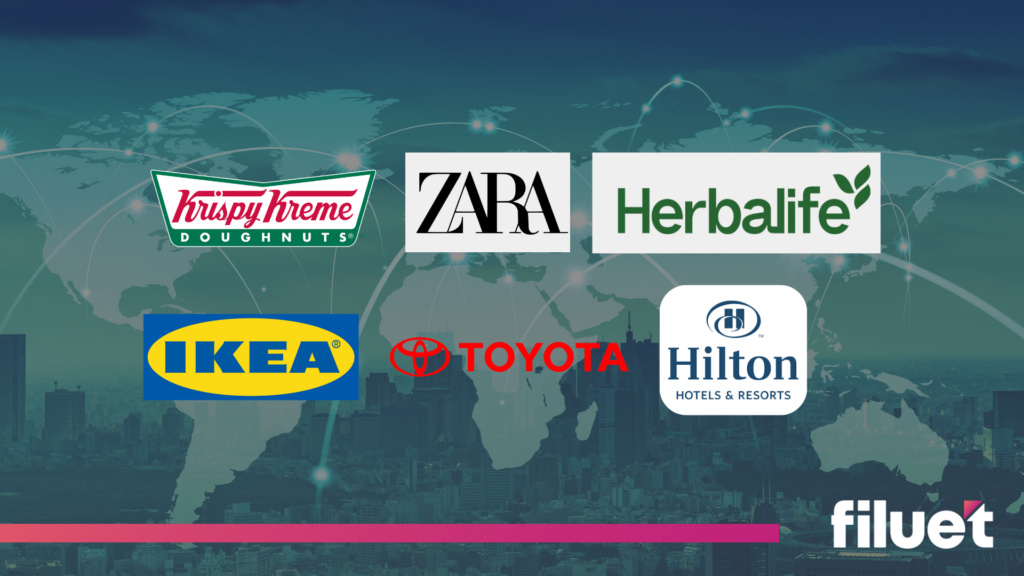If you’ve ever wondered about the stories behind some of the world’s most successful global business expansions, you came to the right place to learn about them.
Global expansion, a pursuit as daunting as it is exhilarating, requires a myriad of strategies and tools, each carefully orchestrated to conquer new frontiers and pave the way for unprecedented success. More often than not, if you’re considering taking the leap into the unknown, there have been companies before you that leaped at least the same distance.
From forging strategic alliances to leveraging cutting-edge technology, these visionary enterprises have mastered the art of transcending borders and reshaping industries on a global scale. Why reinvent the wheel?
We at Filuet know a good thing when we see it, and these 6 examples of global expansions done right are some of our favorites.
- Krispy Kreme

Krispy Kreme started as a small business in North Carolina, U.S., and now has more than 11,000 access points. Krispy Kreme initially succeeded by tying its brand identity to the classic, hot, glazed donut, but they were not afraid to adapt to customer tastes abroad.
They have a Cherry blossom donut in Japan with a sweet and salty center catered to their umami-loving palettes. They have a Tres Leches donut in Puerto Rico, which is an American take on a classic Central American dessert, and a Parma Cheese flavor in Thailand, where the salty cheese is very popular.
Krispy Kreme has excelled at perfecting an iconic product while capturing the unique flavors of its outposts around the world.
Main takeaway: Localize your product.
- IKEA

When you think of IKEA, you probably think of meatballs and missing screws. While flat-pack furniture is not for everyone, it is undeniable that IKEA has revolutionized the way people furnish their homes.
IKEA keeps costs low due to mass production and transferring the tasks of assembly and transportation to the customer. IKEA surveys the local market when expanding and adjusts its prices accordingly. A regional manager, Mark McCaslin, told Bloomberg, “We look at the competition, take their price, and then slash it in half.” They also use local suppliers to reduce costs.
IKEA is now in 31 countries with 680 million customers. Their ability to position themselves as the trendy but affordable option in all their markets makes them a firm favorite worldwide.
Main takeaway: Localize your supply chain.
- Toyota

Though originally a 19th-century loom business, Toyota has become a household name in automobiles since the establishment of the ‘Automotive Production Division’ in 1933.
After developing their products in Japan, they decided to look beyond their borders. They first expanded into Denmark, then set their sights on the largest car market in the world, the US. Toyota realized that shipping entire cars was too costly due to transportation fees and heavy import tariffs, so it decided that collaboration with a US motor company was the best route.
The US car industry was declining in the 70s and 80s, which made a deal with a company like Toyota extra attractive. In 1984, Toyota brokered an agreement with General Motors to produce cars in already established motor plants on US soil.
Their willingness to collaborate with local corporations in a foreign market eventually led to more than 2 million Toyota car sales in the US in 2022.
Main takeaway: Collaborate with third parties
- Hilton Hotels

Originating from a single Texas hotel in 1925, Hilton Hotels are now one of the biggest names in the business. Hilton’s ability to diversify means they now have hotels in 122 countries.
Hilton operates 19 different brands, which allows them to offer something for everyone. There are three luxury brands: Conrad Hotels and Resorts, the Waldorf Astoria, and Tempo Hotels, for their higher-end clientele. There also is Homewood Suites which offers apartments for more extended stays, and Tru for a ‘back-to-basics experience with soul,’ to name just a few.
These varied price points, using one brand identity, suit budgets around the world.
Main takeaway: Diversify your product/service range according to the market.
- Zara

The fashion company started with a single family-run store in Spain in 1975. They offered cheaper copies of high-end fashion and quickly became popular with locals. Zara went international in 1988, and the following year, Zara entered the US. They are now a world leader in fast fashion, present in 96 countries and 49 online markets.
Zara’s success can be attributed to the careful use of data analytics. Each garment is fitted with a microchip that tracks it until it is sold. Up-to-date data about what is selling is communicated back to the design team, who adjust their designs accordingly.
Using location tracking, Zara’s design and distribution teams customize the quantity and specifications of their garments according to what is selling well in each locality. They are able to customize their distribution down to specific neighborhoods.
Main takeaway: Have a solid data collection & analytics system in place for informed decision-making.
- Herbalife

Herbalife was founded in 1980 in Los Angeles and has expanded into more than 90 counties. The brand owes its success to its innovative business ideas, including unmanned access points, which allow customer access 24/7 in areas with low levels of distributors, and regional variations to cater to diverse tastes.
One of the central tenets of their current growth strategy is product expansion. This includes offering flavors like Arroz Con Leche in the LATAM market and Matcha in the APAC region. They are also targeting more niche variations by offering Vegan and GMO-Free products in areas where these issues are of particular concern.
Herbalife has had an exclusive contract with Filuet since 2004, which has proved to be a fruitful partnership. Filuet helped Herbalife expand into 9 new markets between 2000 and 2013. With the support of our one-stop shop for business expansion, Herbalife has continued to grow, with over 10,000 employees in 90 countries, and we even helped open a market in Uzbekistan in 2020 amidst the global pandemic.
Main takeaways: 1) Localize products and 2) partner with a 3PL/4PL that has boots on the ground in your target market.
The Bottom Line
The above are just a handful of success stories. There are many more out there, but most of them have the same elements of success. We’ve conveniently listed the main takeaways in each case. If you’re considering expanding to new markets, which you should, then print these takeaways and hang them in your office. Turn them into mantras!
A business needs collaboration, flexibility, and innovation to succeed with global expansion, but you also need the best possible help by your side.
We at Filuet are experts in bringing your products across borders and can aid you every step of the way. Let us focus on what we do best, so you can focus on your passion and grow your business near and far.
> Read our other article about global expansions gone wrong for further learning<





